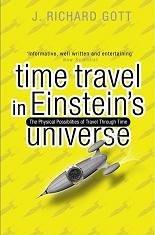
Time Travel in Einstein's Universe
J. Richard Gott
291 pages, including notes and index
published in 2001
I have to say, Time Travel in Einstein's Universe does exactly what it says on the tin, exploring the possibility and methods of timetravel in the universe as we know it since Einstein formulated his formulas about special and general relativity. In the process Gott manages to also explore some of the more exotic theories about our universe and how it came to be. It seems that science fiction writers got stiff competition from astrophysicists these days in dreaming up weird and wonderful posssible universes...
It's this that I have a bit of a problem with here. Granted, this is of course a popular science book, written for thickies and ignoramuses like myself, but it seems to me that a lot of what Gott theorises here is put too strongly as the truth rather than as just a possibility, a theory. For example, at one point he is explaining how the universe might have used timetravel to come into existence, having a closed timeloop for an origin rather than a true origin, now safely in our past so that we can no longer use this timeloop ourselves. Now I'm sure this is all allowed by the maths, but is there any observable support for this theory? That is, can our measurements of the observable universe prove or disprove this theory? Because otherwise, what is the point?
Those quibbles aside, for the most part this is quite an useful primer on timetravel and whether or not it is actually possible in our universe; the good news is, it is, the bad news is, it can be quite difficult. Not so much timetravel to the future; just step into a fast enough rocket and you'll eventually end up in your future without having to travel through quite so much of the intervening years yourself. Relativiy, innit. Timetravel to the past however, is a different kettle of fish. That would involve such exotic things like "cosmic strings with a mass-per-unit length of about 10 million billion tons per centimeter" which "must each move in opposite directions at speeds of at least 99.9999999996 percent of the speed of light". Not an enginering process likely to happen soon.
Gott explains all this with considerable verve, keeping it accessible for interested laypersons like myself, though as noted, with a tendency to be slightly too ready to proclaim these theories the truth. With that caveat, he does very well in building up to the more outlandish possibilities of timetravel, starting with a general introduction to timetravel, which contains little any science fiction reader won't be familiar with, to the posssibilities for timetravel to really exist, to what this may mean for how our universe looks and how it came to be.
All this I enjoyed throughly, with the exception of the last chapter, in which he chances his hand at predicting the future, by using the Copernican principle ("wé're not special"). This assumes that you can predict the lifespan of, well, anything, by noting how long it has existed already and assuming you are witnessing it at a random, non-special moment, i.e. not within the first 2.5 percent of its lifespan nor its last 2.5 percent. Doing so you can then predict with 95 percent confidentiality that it will last for another 1/40th of its existing lifespan to another 40 times its lifespan...
From there he comes to the conclusion, with some further assumptions that it is quite likely the human race will cease to exist relatively soon, though soon on an astrophysicist's timescale, not early Wednesday next week. This all struck me a bit too much as one of these instances where the astrophyisicist should stick to what he knows, rather than as a real insight. For one thing, I don't think the Copernican principle holds anymore when talking about humans, as you could very well argue we are special in many ways which may very well devalue this principle.
On the whole then, an interesting read marred by a concluding chapter that could've just as well been left out and a tendency on part of the writer to be slightly too firm in his convictions...
Read more about:
J. Richard Gott,
time travel,
physics,
science,
book review
